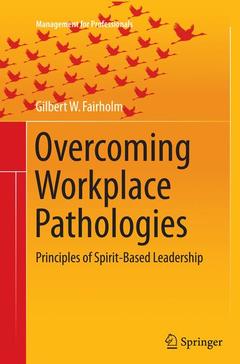Overcoming Workplace Pathologies, 1st ed. 2015 Principles of Spirit-Based Leadership Management for Professionals Series
Auteur : Fairholm Gilbert W.

This book deals directly with the characteristics of the relationships that the leader builds in the context of the work environment. It argues that the prevailing work community work culture is intended to help the leader lead but, increasingly it impedes the leader?s work. Leadership is a function of the leader?s values, attitudes, and aspirations: leadership flows from the leader?s spiritual character-defining core essence. However, the author argues that cultural forces coming from both inside and outside the workplace, often designed to promote diversity, inclusivity, and tolerance, have introduced into the work culture values and behavior that are pathological to executing effective leadership and detrimental to the health of work communities. While attractive on the surface, these new values are toxic to the idea of relationship and thus threaten the work community culture, in effect "killing leadership."
This book will arm leaders with the tools, resources, and techniques to recognize and overcome workplace pathologies. After reading this book, leaders will:
- have a complete understanding of the key principles of spirit-based values leadership
- see clearly that the leader?s values shape both the leader?s one-on-one relationships with coworkers and are at the center of the work culture they create to re-enforce coworker actions and decisions
- appreciate more fully the power of the ambient work culture to influence coworkers toward leader set values and methods guiding the work community
- know the toxic effect on doing leadership of introducing non-work values and standards into the work community culture understand the arguments against allowing subgroups of the work community to form and practice values opposed to the values the leader has set for the full group
- be better prepared to deal with the consequences of encountering evil, hatred and/or fear in the workplace
- realize that not all coworkers are uniformly honest and truthful and learn ways to counter this behavior and still accomplish the work community?s goals and ensure its productivity
The result is a pragmatic approach to aligning values, behaviors, and performance, while enhancing the principles of effective and positive leadership throughout the organization.
Gil W. Fairholm is Emeritus Professor of Public Administration at Virginia Commonwealth University, and was Adjunct Professor of Management Systems in the Robins School of Business, University of Richmond. He has extensive background as a government executive serving as Administrator of State and Local Finance, Wisconsin Department of Revenue, Deputy Administrative Director, New York State Department of Motor Vehicles, Deputy Director, New York State Office for Community Affairs, Principle Management Analyst, New York State Division of the Budget, Director of Management Improvement, New York State Department of Transportation, and City Manager in Layton, Utah.
He has consulted extensively in government, university and business environments. He headed a university-based consultation service giving advice and policy guidance to top-level African local government officials; developed the first urban government structure in Northern Nigeria; and analyzed operations, decision systems, policy implementation, and personnel and financial relationships. He has significant experience consulting with Virginia state and local governments. Gil also developed policy proposals respecting community relations in urban renewal agencies in Philadelphia and prepared program budgeting systems for all Puerto Rican cities.
Much of this work has been developmental in nature, e.g. creating 3 university leadership programs; serving as first city manager in a new Council-Manager city; creation of a system of urban government forms for Northern Nigeria where none existed before; consolidating transportation-related functions in New York into a new department, defining its goals and describing its structure and procedures and coordinating new program and systems developments.
Gil is the author of over 150 articles, reports and analyses. His 14 books are a direct result of his practical work, but reflect a theory-building, even a philosophical bent. They represent a culmin
Defines the principles, goals, and methods of spirit-based value leadership
Argues that movements designed to promote inclusivity and tolerance in the workplace have actually resulted in greater divisiveness and distrust
Provides techniques and tools for leaders to identify and overcome the sources of divisiveness and antagonism to create more harmonious and productive workplaces
Date de parution : 10-2016
Ouvrage de 184 p.
15.5x23.5 cm
Date de parution : 07-2015
Ouvrage de 184 p.
15.5x23.5 cm



